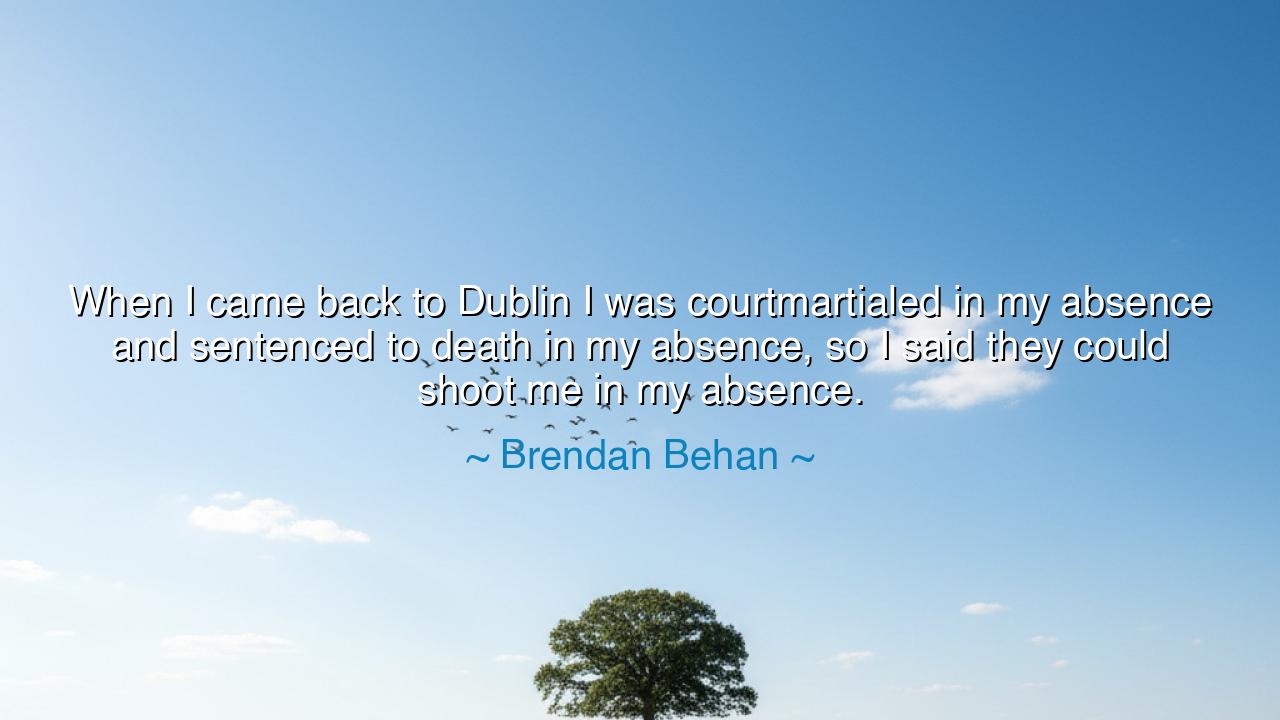
When I came back to Dublin I was courtmartialed in my absence and
When I came back to Dublin I was courtmartialed in my absence and sentenced to death in my absence, so I said they could shoot me in my absence.






The words of Brendan Behan, when he declared, “When I came back to Dublin I was court-martialed in my absence and sentenced to death in my absence, so I said they could shoot me in my absence,” are not merely a jest; they are a window into the spirit of defiance that has marked both rebels and poets throughout the ages. In this statement — half laughter, half lament — we find the essence of Behan himself: fierce, irreverent, unbowed. Beneath the humor lies the timeless courage of one who meets authority’s threat not with fear, but with wit, turning the weapon of oppression into the mockery of the oppressor.
To understand the origin of these words, one must recall Behan’s youth — an Irish writer and revolutionary born into a family steeped in the struggle for independence. As a member of the Irish Republican Army, he was arrested in his teens for carrying explosives and later imprisoned. The British authorities, seeing in him both a rebel and a threat, charged him with treason and violence. Yet even when condemned, Behan refused to let the shadow of death diminish his spirit. His retort — that if he could be condemned in his absence, then they might as well execute him in his absence — was his way of reclaiming dignity from absurdity. It was the laughter of a free man, one who would rather mock the gallows than bow before it.
This kind of defiance is not new; it echoes through the history of resistance. The ancients would have seen in Behan the same indomitable fire that burned in Socrates, who met his death with calm irony, or in Diogenes, who mocked the powerful from his humble barrel. It is the voice of the philosopher-warrior, who recognizes that tyranny can punish the body but never command the soul. Behan’s laughter was not ignorance of danger; it was mastery over it. To jest in the face of death is the highest form of courage — it declares that the spirit remains unconquered, that fear has lost its dominion.
Indeed, in Behan’s Ireland, humor was both shield and sword. The Irish, long oppressed, learned to meet power with wit — to endure the unbearable by laughing at it. In this sense, Behan’s words are the continuation of a long tradition: the art of defiant humor. Just as the slaves of Rome told jokes about their masters, and medieval peasants mocked their kings in secret songs, Behan turned the machinery of state into the butt of his joke. His laughter said, in essence, “You may control my fate, but not my freedom of mind.” This is the wisdom of the oppressed made immortal — the laughter that transforms suffering into strength.
There is also, within his jest, a lesson about absurdity — that the systems of power often condemn themselves by their own excess. To be “sentenced to death in absence” is to expose the hollowness of justice turned to ritual, of authority gone mad with its own importance. Behan’s response unmasks the farce of it all. It reminds us that truth often hides beneath irony — that to laugh at injustice is to strip it of its majesty. His defiance turns the court-martial into a comedy, the sentence into a self-inflicted wound upon tyranny itself.
From this, we learn a deeper wisdom: that humor is not weakness, but a weapon of the wise. When faced with oppression, cruelty, or absurdity, to maintain one’s wit is to remain unbroken. Behan teaches that there is a power greater than rage — the power to mock one’s tormentor and remain human. The ancients would call this philosophical laughter — not the laughter of ignorance, but of understanding. For to laugh in the face of death is to remind the world that mortality belongs to all, and that dignity belongs to those who meet it with grace.
So, let these words echo in the hearts of future generations: when the world seeks to judge you unjustly, answer not with fear, but with freedom — the freedom of thought, the freedom of laughter. Build within yourself a calm defiance, a wit so deep that no tyranny can silence it. Like Behan, do not let your oppressors write the last line of your story. If they condemn you in your absence, let them also shoot you in your absence — for your spirit, unchained and unafraid, will already have transcended them.
And thus, through humor, Behan teaches the wisdom of the ancients: that to laugh at death is to triumph over it. For the tyrant fears the man who does not fear him, and the gods themselves smile upon those who, even in the shadow of doom, can still find joy in being alive, free, and unafraid.






AAdministratorAdministrator
Welcome, honored guests. Please leave a comment, we will respond soon